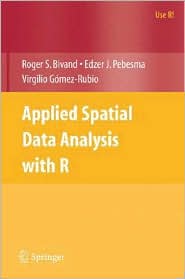
|
FreeComputerBooks.com
Links to Free Computer, Mathematics, Technical Books all over the World
|
|
- Title: Applied Spatial Data Analysis with R
- Author(s) Roger S. Bivand, Edzer J. Pebesma and V. Gomez-Rubio
- Publisher: Springer; 1 edition (August 14, 2008)
- Paperback: 378 pages
- eBook: PDF
- Language: English
- ISBN-10: 0387781706
- ISBN-13: 978-0387781709
- Share This:

|
Applied Spatial Data Analysis with R is divided into two basic parts, the first presenting R packages, functions, classes and methods for handling spatial data. This part is of interest to users who need to access and visualise spatial data. Data import and export for many file formats for spatial data are covered in detail, as is the interface between R and the open source GRASS GIS. The second part showcases more specialised kinds of spatial data analysis, including spatial point pattern analysis, interpolation and geostatistics, areal data analysis and disease mapping. The coverage of methods of spatial data analysis ranges from standard techniques to new developments, and the examples used are largely taken from the spatial statistics literature.
All the examples can be run using R contributed packages available from the CRAN website, with code and additional data sets from the book's own website.
This book will be of interest to researchers who intend to use R to handle, visualise, and analyse spatial data. It will also be of interest to spatial data analysts who do not use R, but who are interested in practical aspects of implementing software for spatial data analysis. It is a suitable companion book for introductory spatial statistics courses and for applied methods courses in a wide range of subjects using spatial data, including human and physical geography, geographical information systems, the environmental sciences, ecology, public health and disease control, economics, public administration and political science.
The authors have taken part in writing and maintaining software for spatial data handling and analysis with R in concert since 2003.
About the Authors- Roger Bivand is Professor of Geography in the Department of Economics at Norges Handelshoyskole, Bergen, Norway.
- Edzer Pebesma is Professor of Geoinformatics at Westfalische Wilhelms-Universitat, Munster, Germany.
- Virgilio Gomez-Rubio is Research Associate in the Department of Epidemiology and Public Health, Imperial College London, London, United Kingdom.
- Geographic Information System (GIS) and Web Mapping
- Data Analysis and Data Mining
- The R Programming Language
- Statistics, and SAS Programming

- Applied Spatial Data Analysis with R (Roger S. Bivand, et al)
- The Mirror Site (1) - PDF
- The Mirror Site (2) - PDF
- Book Homepage (Source Code, Data Sets, Errata, etc.)
-
 Spatial Data Science: With Applications in R (Edzer Pebesma, et al)
Spatial Data Science: With Applications in R (Edzer Pebesma, et al)
Introduces and explains the concepts underlying Spatial Data, gives a detailed explanation of the core spatial software packages for R: sf for simple feature access, and stars for raster and vector data cubes – array data with spatial and temporal dimensions.
-
 Geocomputation with R (Robin Lovelace, et al.)
Geocomputation with R (Robin Lovelace, et al.)
This book is for people who want to analyze, visualize and model geographic data with open source software. It is based on R, a statistical programming language that has powerful data processing, visualization, and geospatial capabilities.
-
 Geospatial Analysis with Python (Ujaval Gandhi)
Geospatial Analysis with Python (Ujaval Gandhi)
Suitable for GIS practitioners with no programming background or python knowledge. The course will introduce basic Python programming concepts, libraries for spatial analysis, geospatial APIs and techniques for building spatial data processing pipelines.
-
 Applied Statistics with R (David Dalpiaz)
Applied Statistics with R (David Dalpiaz)
This book provides an integrated treatment of statistical inference techniques in data science using the R Statistical Software. It provides a much-needed, easy-to-follow introduction to statistics and the R programming language.
-
 Learning Statistics with R (Daniel Navarro)
Learning Statistics with R (Daniel Navarro)
This book takes you on a guided tour of software development with R, from basic types and data structures to advanced topics like closures, recursion, and anonymous functions. No statistical knowledge is required.
-
 The Art of R Programming: A Tour of Statistical Software Design
The Art of R Programming: A Tour of Statistical Software Design
A guided tour of software development with R, from basic types and data structures to advanced topics like closures, recursion, and anonymous functions. No statistical knowledge is required, and your programming skills can range from hobbyist to pro.
-
 Efficient R Programming: Practical Guide to Smarter Programming
Efficient R Programming: Practical Guide to Smarter Programming
This book is about increasing the amount of work you can do with R in a given amount of time. It's about both computational and programmer efficiency. This book is for anyone who wants to make their use of R more reproducible, scalable, and faster.
-
 Mastering Software Development in R (Roger D. Peng, et al.)
Mastering Software Development in R (Roger D. Peng, et al.)
The book covers R software development for building data science tools. As the field of data science evolves, it has become clear that software development skills are essential for producing useful data science results and products.
-
 Hands-On Programming with R: Functions and Simulations
Hands-On Programming with R: Functions and Simulations
This book not only teaches you how to program, but also shows you how to get more from R than just visualizing and modeling data. You’ll gain valuable programming skills and support your work as a data scientist at the same time.
-
 R Programming for Data Science (Roger D. Peng)
R Programming for Data Science (Roger D. Peng)
This book is about the fundamentals of R programming. Get started with the basics of the language, learn how to manipulate datasets, how to write functions, and how to debug and optimize code. You will have a solid foundation on data science toolbox.





